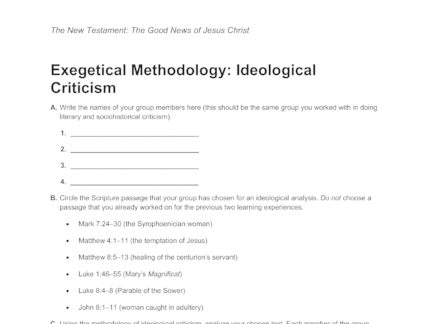
Some scholars view the New Testament primarily as an ancient resource for learning about history. Cultural anthropologists study such matters as kinship relations and value systems, drawing comparisons or analogies from other cultures to understand better the New Testament context.


Scholars trained in sociology examine the New Testament writings in light of such phenomena as the diaspora migrations of Jewish people and the military occupation of Palestine.

Some scholars examine the New Testament with perspectives and tools derived from the social sciences. They have also discovered ancient documents from this period, such as the Dead Sea Scrolls and the Nag Hammadi Gnostic library. They have uncovered an enormous amount of physical evidence that supplies background information for interpreting these texts for example, the discovery of a Galilean fishing boat from the time of Jesus has revealed that such vessels were constructed with an exceptionally low draft, making them especially susceptible to storms. Archaeologists excavate ancient cities and other sites important to the New Testament world. Their goal is to reconstruct what the original manuscripts probably said, noting also variant readings when one or more of the copies that have been made over the years say something different.Īrchaeology. Text critics analyze the various manuscripts of the New Testament that have been preserved over the centuries, comparing them, dating them, and employing various techniques to determine which are the most reliable. They do so, however, in ways that serve a variety of interests thus, the academic field of New Testament study has developed into a discipline that encompasses different approaches and employs a variety of methods. Biblical scholars usually study the New Testament with particular attention to historical and literary concerns.


 0 kommentar(er)
0 kommentar(er)
